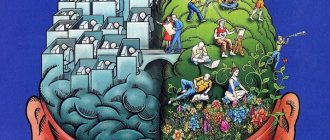How is it different from material needs?
The spiritual needs of a person, unlike material ones, do not satisfy personal needs: hunger, cold, safety measures. The pleasure from filling the inner world is moral, mainly of an aesthetic nature.
Selflessness of people - what is it?
The difference is easy to determine by motivations - the reasons that incline a person to resolve issues. Material needs arise from immediate needs and are the tactical, momentary side of life. Strength of mind is driven not by specific benefits, but by curiosity. The desire to explore the unknown is motivated by the hope of obtaining benefits in the future.
The means of satisfying material demands are specific and depend on the resource base. The only tool for replenishing spiritual potential is creativity.
Important! The definition of forms of creative self-expression is based on communication and cognition.
The communicative function of consciousness facilitates the receipt of significant media from printed, graphic and audio sources, including direct communication with the carrier of the required information. The cognitive part is focused on processing the information received, removing unnecessary things and assimilating relevant data.
Real and imaginary
There are also such types of needs as genuine and imaginary. Genuine needs are those needs that a person comes to on his own. If a person has a desire to take up music, this is a genuine need. If he begins to play music after being influenced from outside - relatives, friends, society, such a need becomes imaginary.
All human needs must be reasonable, since not all human needs can be satisfied in a short time, and they should not oppose the moral and moral foundations of society.
Main signs of spiritual needs
The strangest phobias people have
A short list of characteristics of spiritual inquiries includes:
- arise in consciousness;
- have a relative nature of need, a choice of methods for reproduction;
- the degree of satisfaction of needs is determined by the availability of free time, the amount of accumulated wealth of the spirit, the desire and ability of a person to participate in their implementation;
- the relationship between subject and object is built on selflessness;
- the process of realizing spiritual needs is unlimited.
Basic human needs
Spiritual food is objective in content. The circumstances of people’s lives and the need to understand the external environment help explain its essence. The more developed a civilization is, the more noticeable the law of “increasing demands” operates; the more important for most individuals is the acquisition of spiritual and cultural values. At the same time, the need for spiritual development is subjective and appears to be a reflection of people’s inner world, social and personal essence.
Human interests
Needs are the basis of the interests of each person and his abilities. Interest is a person’s purposeful position regarding the object of his need. People's interests are not really directed to the object of their need, but to the process that makes it available. Interests depend on what social group the individual belongs to and what status he occupies in society.
There is the following classification of human interests: 1. Depending on their carrier - public, group, individual 2. Depending on the orientation - spiritual, social, political.
Each person needs to be aware of their interests, and when realizing them, take into account the interests of other people. Interests should not be of a strategic nature to achieve them. Without understanding whether an interest is genuine or imaginary, a person often achieves his goal by neglecting the interests of other individuals, which contradicts all human norms of humanity.
Types of spiritual needs
Delusions of grandeur - what does it mean in people?
The main needs in the spiritual sphere are conventionally divided into 2 parts: one is related to the accumulation of spiritual potential, the second is its manifestation in society.
The first group consists of:
- communication and observation of real and fictional characters from books, plays, movies;
- aesthetic satisfaction from beautiful landscapes, artwork, musical compositions;
- scientific and educational activities that expand the boundaries of worldview;
- maintaining health as a foundation for new beginnings.
The second group includes social needs:
- Labor activity that contributes to the materialization of spiritual needs.
- Moral guidelines used to compare one's own views on a situation with generally accepted ideals;
- The patriotic component of actions, orienting the individual towards defense and love for the fatherland.
The sequence of implementation of the requests of both groups cannot be called linear. More often it is associated with material needs and the inner world of the subject.
Need for cognition
A person who feels the need to learn new things strives to diversify everyday life, broadens his horizons through courses, master classes, and literary works. A natural interest in external factors encourages people to take active steps to improve their knowledge and abilities. If the need is not satisfied, the person withdraws and may have a negative attitude towards change.
Self improvement
Self-improvement is the ability to independently develop the mind, take care of personal growth, and cultivate positive personality traits. The process of self-development is intellectual and presupposes a person’s awareness of his own place in the world, motives, and results of activities. At the same time, the process is volitional and depends on the specific situation and lifestyle of the individual.
Self-development strategy
At the stage of self-improvement, it is important to draw analogies with yesterday’s existence. Awareness of personal development has a positive effect on new areas of life. Dreams become bolder, plans become more far-reaching, and hope for the future appears. For ideal self-improvement, you need to clearly define your goals.
Important! Uncertainty and fear have a destructive effect on the outcome of events. You shouldn’t look at others, people are free to choose their actions and desires.
Favourite buisness
A favorite activity charges you with energy for self-realization, gives meaning to reality, inspires you to great deeds, and helps you express your individuality. On the way to the goal, individuals use their own talent, mental and physical abilities. A person who devotes most of his time to creativity or business will not voluntarily give up what he loves.
Love and happiness
Love is kindness that gives people positive emotions, and the need to make everyone around happy, enjoying other people's happiness as the personification of one's own feelings. The need to radiate love is stronger than material needs, social status and business success. Every person wants to feel needed and in demand by the people around them. Loneliness brings melancholy and boredom, creating, first of all, a feeling of inner emptiness.
Maslow's theory
The theory of A. Maslow, an American sociologist (his photo is presented below), has gained great popularity in modern Western literature. All needs, in accordance with this classification, can be arranged in the form of a pyramid, in ascending order from material (“lower”) needs to spiritual (“highest”) needs.
The following types are distinguished:
- physiological needs (drinking, eating, etc.);
- safe (protected from fear, anger and pain, etc.);
- in social connections (friendships, family, religious);
- in acquiring social status (approval, recognition);
- in self-expression (realization of personality abilities).
This classification can be presented in the form of a pyramid, at the top of which there will be needs for self-expression, and at the base - physiological. Lower order needs, according to Maslow, are physiological and safety needs, and higher order needs are for social status and self-expression. Higher needs do not arise until the lower ones are satisfied.
Opportunities to satisfy spiritual needs
The following will help you realize your spiritual qualities:
- Outdoor recreation, travel. Enjoying the beauty of the world around you and admiring its versatility is a simple way to stay in harmony with yourself.
- Introduction to art. Architecture, music, amateur performances - there are many ways to express spiritual needs and satisfy them through culture. It is enough to choose a direction to your liking, visit exhibitions, museums, theaters. Good examples would be reading books and listening to the music of great composers.
- Finding harmony with yourself. Psychologists recommend spending 10 minutes a day for a quiet walk in a deserted park or meditation. The inner “I” will give important answers to questions of interest. All you have to do is listen.
- Pet care. Active interaction between a person and a furry animal reduces tension, returns a smile and helps to relax. By protecting and preserving weak beings, a person becomes stronger.
- Creative activities. Whether it’s clumsy crafts or works of a talented craftsman, the results of creative work satisfy spiritual hunger and make the individual happy.
Finding spiritual harmony through unity with nature
Spiritual needs require careful attention and long preparation. However, through trial and error, learning and getting burned, a person is able to find optimal ways of implementation. The result will lead to lasting harmony and the understanding that time and effort were not wasted.
Historical nature and dynamism of needs
The economic needs of society are historical in nature. The methods of satisfying them and their extent depend on the life demands and habits with which society as a whole, social strata and individual people were formed, that is, in what socio-historical conditions they find themselves. The economic needs of society are dynamic. Social progress, human improvement, intensity of information exchange - these are the factors under the influence of which requests change.
Continuous changes in the qualitative and quantitative ratio that economic needs and benefits undergo, a steady increase in the process of evolutionary development of society, is the law of increasing needs. Their change occurred at a relatively low rate, smoothly over many centuries and millennia. Today, the rate at which economic needs and goods are growing has accelerated significantly. At the same time, there is a social uniformity in their rise, and the emergence of needs of a higher order among ever larger masses of the population.
Why Spiritual Needs Are Harder to Satisfy
Spiritual needs are created by the person himself; they are difficult to satisfy, since other needs must first be fulfilled. For example, to gain knowledge, you need to find sources (literature, website), learn and take notes on the material. An additional obstacle is finding activities to your liking. The business should bring not material, but spiritual joy.
The type of life activity of people depends on spiritual needs. Material needs will not stop the development of strong spiritual natures. Primitiveness, rudeness, and imaginary multitasking are being replaced by more refined and subtle things. This principle is the basis of human progress. You need to remember about the soul and constantly strive to achieve new heights.
Public goods
Public goods are those goods that are in collective, common consumption. For example, public order, national defense, street lighting, etc. Non-excludability from consumption and indiscriminateness are the distinctive features of this type of benefit.
Indiscriminateness means that such goods cannot be provided to an individual without simultaneously satisfying the needs of other people. Non-excludability means indivisibility, that is, consumers who have not paid for their production cannot be excluded from using them. The state, acting as the producer of these goods, granting the right to non-payers to use them, uses special methods of influencing them. Producers of private goods behave differently.
Social needs of the individual
This is a special kind of human need. It lies in the need to have everything necessary for the existence and functioning of an individual, a social group, or society as a whole. This is an internal motivating factor for activity.
Social needs are the need of people for work, social activity, culture, and spiritual life. The needs created by society are those needs that are the basis of social life. Without motivating factors to satisfy needs, production and progress in general are impossible.
Social needs also include those associated with the desire to form a family, joining various social groups, teams, various areas of production (non-production) activity, and the existence of society as a whole. Conditions and environmental factors that surround an individual in the process of his life not only contribute to the emergence of needs, but also create opportunities to satisfy them. In human life and the hierarchy of needs, social needs play one of the determining roles. The existence of an individual in society and through it is the central area of manifestation of the essence of man, the main condition for the realization of all other needs - biological and spiritual.
Social needs are classified according to three criteria: the needs of others, their own needs, and common needs.
The needs of others (needs for others) are needs that express the generic basis of the individual. It lies in the need for communication, protection of the weak. Altruism is one of the expressed needs for others, the need to sacrifice one's interests for others. Altruism is realized only through victory over egoism. That is, the need “for oneself” must be transformed into a need “for others.”
One’s own need (need for oneself) is expressed in self-affirmation in society, self-realization, self-identification, the need to take one’s place in society and the team, the desire for power, etc. Such needs are therefore social, because they cannot exist without needs “for others.” " Only through doing something for others is it possible to realize your desires. Take some position in society, i.e. It is much easier to achieve recognition for oneself without affecting the interests and claims of other members of society. The most effective way to realize your egoistic desires will be a path along which a share of compensation is contained to satisfy the claims of other people, those who can claim the same role or the same place, but can be satisfied with less.
Joint needs (needs “together with others”) - express the motivating power of many people at the same time or society as a whole. For example, the need for security, freedom, peace, a change in the existing political system, etc.











